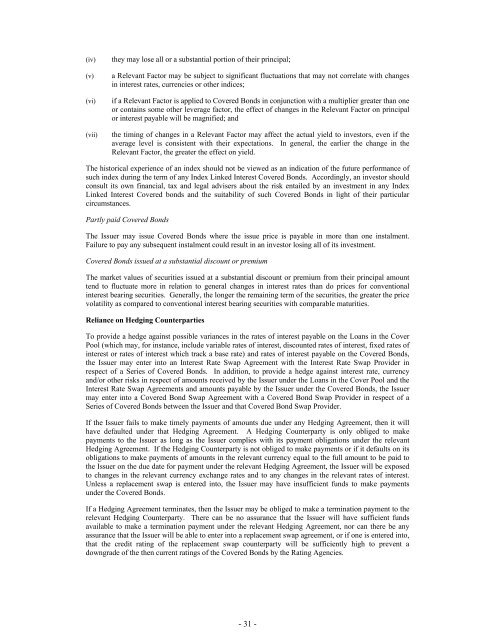MARFIN EGNATIA BANK S.A. - Irish Stock Exchange
MARFIN EGNATIA BANK S.A. - Irish Stock Exchange
MARFIN EGNATIA BANK S.A. - Irish Stock Exchange
You also want an ePaper? Increase the reach of your titles
YUMPU automatically turns print PDFs into web optimized ePapers that Google loves.
(iv)<br />
(v)<br />
(vi)<br />
(vii)<br />
they may lose all or a substantial portion of their principal;<br />
a Relevant Factor may be subject to significant fluctuations that may not correlate with changes<br />
in interest rates, currencies or other indices;<br />
if a Relevant Factor is applied to Covered Bonds in conjunction with a multiplier greater than one<br />
or contains some other leverage factor, the effect of changes in the Relevant Factor on principal<br />
or interest payable will be magnified; and<br />
the timing of changes in a Relevant Factor may affect the actual yield to investors, even if the<br />
average level is consistent with their expectations. In general, the earlier the change in the<br />
Relevant Factor, the greater the effect on yield.<br />
The historical experience of an index should not be viewed as an indication of the future performance of<br />
such index during the term of any Index Linked Interest Covered Bonds. Accordingly, an investor should<br />
consult its own financial, tax and legal advisers about the risk entailed by an investment in any Index<br />
Linked Interest Covered bonds and the suitability of such Covered Bonds in light of their particular<br />
circumstances.<br />
Partly paid Covered Bonds<br />
The Issuer may issue Covered Bonds where the issue price is payable in more than one instalment.<br />
Failure to pay any subsequent instalment could result in an investor losing all of its investment.<br />
Covered Bonds issued at a substantial discount or premium<br />
The market values of securities issued at a substantial discount or premium from their principal amount<br />
tend to fluctuate more in relation to general changes in interest rates than do prices for conventional<br />
interest bearing securities. Generally, the longer the remaining term of the securities, the greater the price<br />
volatility as compared to conventional interest bearing securities with comparable maturities.<br />
Reliance on Hedging Counterparties<br />
To provide a hedge against possible variances in the rates of interest payable on the Loans in the Cover<br />
Pool (which may, for instance, include variable rates of interest, discounted rates of interest, fixed rates of<br />
interest or rates of interest which track a base rate) and rates of interest payable on the Covered Bonds,<br />
the Issuer may enter into an Interest Rate Swap Agreement with the Interest Rate Swap Provider in<br />
respect of a Series of Covered Bonds. In addition, to provide a hedge against interest rate, currency<br />
and/or other risks in respect of amounts received by the Issuer under the Loans in the Cover Pool and the<br />
Interest Rate Swap Agreements and amounts payable by the Issuer under the Covered Bonds, the Issuer<br />
may enter into a Covered Bond Swap Agreement with a Covered Bond Swap Provider in respect of a<br />
Series of Covered Bonds between the Issuer and that Covered Bond Swap Provider.<br />
If the Issuer fails to make timely payments of amounts due under any Hedging Agreement, then it will<br />
have defaulted under that Hedging Agreement. A Hedging Counterparty is only obliged to make<br />
payments to the Issuer as long as the Issuer complies with its payment obligations under the relevant<br />
Hedging Agreement. If the Hedging Counterparty is not obliged to make payments or if it defaults on its<br />
obligations to make payments of amounts in the relevant currency equal to the full amount to be paid to<br />
the Issuer on the due date for payment under the relevant Hedging Agreement, the Issuer will be exposed<br />
to changes in the relevant currency exchange rates and to any changes in the relevant rates of interest.<br />
Unless a replacement swap is entered into, the Issuer may have insufficient funds to make payments<br />
under the Covered Bonds.<br />
If a Hedging Agreement terminates, then the Issuer may be obliged to make a termination payment to the<br />
relevant Hedging Counterparty. There can be no assurance that the Issuer will have sufficient funds<br />
available to make a termination payment under the relevant Hedging Agreement, nor can there be any<br />
assurance that the Issuer will be able to enter into a replacement swap agreement, or if one is entered into,<br />
that the credit rating of the replacement swap counterparty will be sufficiently high to prevent a<br />
downgrade of the then current ratings of the Covered Bonds by the Rating Agencies.<br />
- 31 -

















